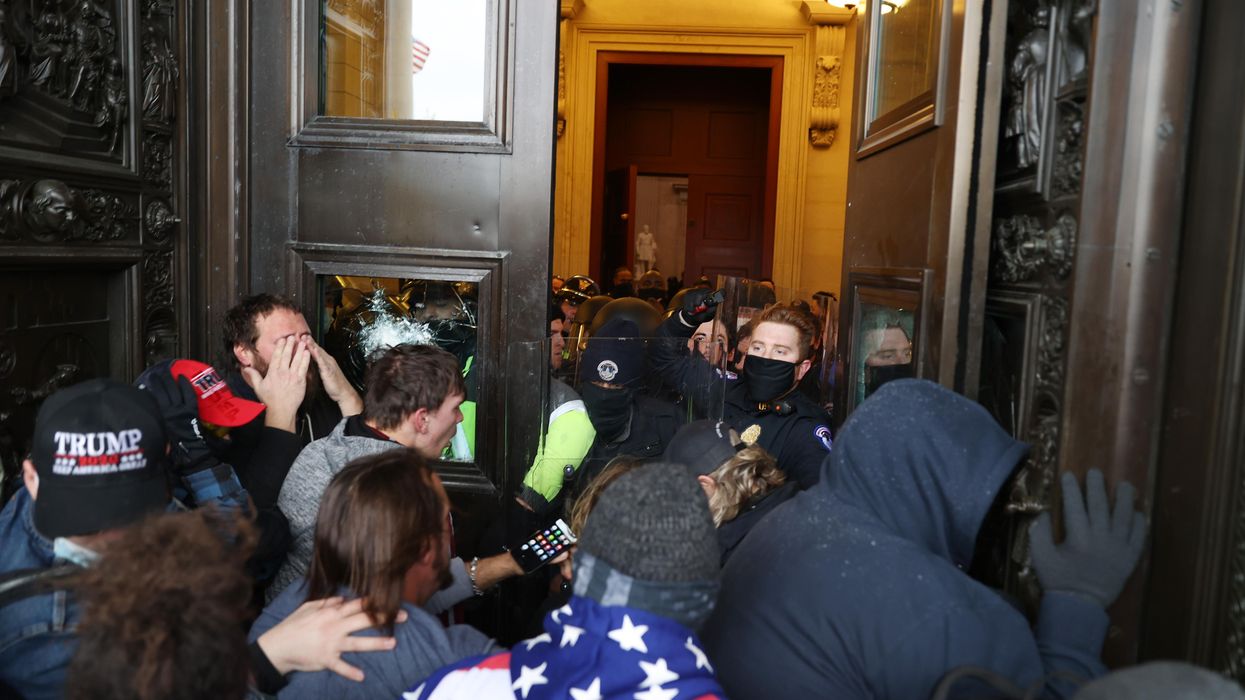From the moment rioters breached the building on Jan. 6, 2021, the attack on the U.S. Capitol has been politicized. Democrats have used it as an anti-Trump rallying cry; Republicans have mostly condemned the rioters while placing blame on the media, the left wing of the nation, and Democratic leaders in Congress.
As the nation prepares to mark the first anniversary of the storming of the Capitol on Thursday, Americans are no closer to unity. And both parties are using the occasion to push their own agenda.
For Democrats, that means one more push to pass the Freedom to Vote Act in the Senate, where it and other election-related legislation remain stymied by Republican filibusters. But Senate Majority Leader Chuck Schumer is expected to put the Freedom to Vote Act on the floor this week, directly tying it to Jan. 6.
Once again, Democrats will fail to find the 10 Republican votes needed to overcome a GOP filibuster and advance the bill. Schumer and the rest of his party know this, but hope the emotions evoked by the anniversary of the insurrection may convince two moderate Democrats to support fundamental changes to Senate rules that would allow the bill to get through the chamber.
Barring a change of heart by Republicans, the only way to pass the voting rights legislation is to change or eliminate the filibuster rule, which allows the minority to prevent the Senate from approving legislation. The filibuster was designed to give a voice to the minority and force the majority to negotiate. But in the 21st century Senate, both parties use it as a blocker, rather than a negotiating tool.
While some Democrats and liberal voting rights advocates want to change the rules, either by eliminating the filibuster or creating a “carve out” for voting rights legislation, their colleagues Kyrsten Sinema of Arizona and Joe Manchin of West Virginia remain adamantly opposed. Backers of the legislation hope the emotions of the week will spur a change in the Democratic pair’s thinking.
However, Sinema and Manchin are unlikely to be swayed unless more Republicans get on board.
Meanwhile, some members of Congress are focused this week on Capitol security during the riot. The Senate Rules and Administration Committee will hold a hearing Wednesday to review the Capitol Police response, and House Minority Leader Kevin McCarthy has already made that subject a key talking point this week.
“As we have said from the start, the actions of that day were lawless and as wrong as wrong can be. Our Capitol should never be compromised and those who broke the law deserve to face legal repercussions and full accountability,” McCarthy wrote in a letter to House Republicans. “Unfortunately, one year later, the majority party seems no closer to answering the central question of how the Capitol was left so unprepared and what must be done to ensure it never happens again. Instead, they are using it as a partisan political weapon to further divide our country.”
A new CBS News/YouGov poll conducted at the end of December found an overwhelming majority of Americans — 83 percent — disapprove of the Jan. 6 attack on the Capitol, including 76 percent of Republicans. However, they were divided over who was involved, with 41 percent of Republicans saying most of the people who forced their way into the Capitol were left-leaning groups (there’s no evidence of this). Overall, 79 percent of respondents said Trump supporters were responsible.
In a scary sign of times ahead, 62 percent said they expect there will be violence from the losing side in future presidential elections. While under 5 percent of respondents who identify with either party definitely said they would favor such violence, 15 percent of Democrats and 30 percent of Republicans said it “depends.” The issues most likely to justify violence were civil rights (35 percent), gun policies (29 percent) and election results (28 percent).
Polling by The Washington Post and University of Maryland found similar results on the use of violence. One-third of Americans told pollsters in mid-December think it is sometimes justified to take violent action against the government.
The biggest reasons in the poll were: taking away people’s rights (22 percent), the collapse of democracy or a coup (15 percent) and violation of the Constitution by the government (13 percent).
While a majority of Americans remain positive about democracy, that number is dwindling: 54 percent told the Post/Maryland pollsters that they are very or somewhat proud of the way Democracy works in the United States. That number has been in steady decline for the past 20 years. In September 2001, following the 9/11 attacks, that number hit 96 percent and has been dropping ever since.
While the country rallied together around 9/11, it was driven further apart by 1/6.




















Why does the Trump family always get a pass?